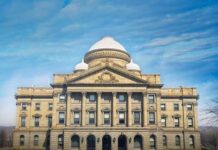In a Facebook live stream chat Thursday Pennsylvania Auditor General Eugene DePasquale said the COVID-19 pandemic is exposing inequalities in the state’s public education system, and voiced concern about the decision to move forward with school contact sports like football this fall.
“It’s hard to find a tougher advocate” of school sports, DePasquale said when asked for his take on the Pennsylvania Interscholastic Athletic Association’s green light on resuming sports this fall. He cited the lessons he learned playing baseball and football in high school and college.
But he also cited recent news that nearly a third of Clemson University’s football team has tested positive for COVID-19 already.
“I think it’s going to be a real struggle to see how some of the contact sports move forward in the fall. I don’t say that with any glee. We’ve got a long way to go to see if there are going to be real games this fall. We’ve all got to think this through.”
On the flip side of the issue, he noted how important the season can be for seniors.
“Losing your senior year can have significant consequences on athletic scholarships,” DePasquale said, suggesting districts and the PIAA may have to find alternative ways to make sure athletes “get seen by colleges.”
The chat was held with Education Law Center Staff Attorney Paige Joki sharing the screen with DePasquale,. The ELC has long advocated for the state to more equitably fund schools, citing multiple studies that the Keystone State has one of the most unequal funding systems in the country, thanks to a heavy reliance on local property taxes.
The Center has spearheaded a lawsuit which contends the state is violating its own Constitution with the current funding system. The suit, filed in 2014, has multiple parties involved, including local parent Tracey Hughes and the Wilkes-Barre Area School District.
Paige and DePasquale noted the pandemic and the order last March to close schools and switch to remote-only learning exposed inequities between districts, which will likely be back on display when many districts open this fall using a hybrid system with some students in schools while other stay home and learn online. The move is intended to allow students in school to keep the six feet of “social distancing” recommended by experts to curb the spread of the disease.
DePasquale said when he was a state Representative for York, the district had roughly 10 percent of students “functionally homeless, which makes remote learning problematic. Paige said the ELC expects more homeless students for may districts thanks to job losses and financial strain due to the pandemic.
DePasquale also said the remote-learning experience has also shown the state’s “digital divide,” with some students lacking the computer equipment to learn online, and others not even having internet access in rural areas. Paige agreed, citing an instant when a parent the ELC was helping had to “wait in line for multiple hours in the rain” for a computer device, only to find out at home that it didn’t work.
“It’s been stunning, the difference students have in resources,” she said.
DePasquale discussed the expected increase cost for transportation if districts try to maintain social distancing on each school bus. Both he and Paige argued the federal government is the only entity with the resources to make sure schools have enough money to opens safely, though the Auditor General offered a state option: drop the state’s mandatory annual standardized testing, and use the money saved to help schools deal with the pandemic.
The idea echoed a scathing report DePasquale’s office issued last summer criticizing the annual state high school “Keystone Exams,” calling them a waste of money and suggesting they be scrapped. Education Secretary Pedro Rivera countered that federal law requires some sort of accountability system, and that the Keystone Exams fulfill that mandate.
Reach Mark Guydish at 570-991-6112 or on Twitter @TLMarkGuydish




